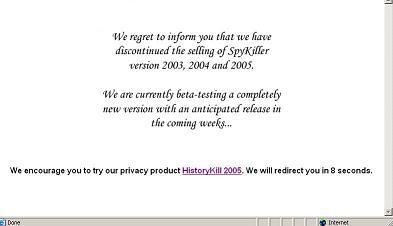FTC goes after Trustsoft for marketing SpyKiller deceptively.
Spykiller is listed on the SpywareWarrior Rogue/Suspect list
A visit to their website reveals this message:
The FTC alleges that Trustsoft:
• Aggressively and deceptively marketed SpyKiller, using the Web sites of affiliates, banner and pop-up ads, and spam.
• Sent pop-up and e-mail messages informing consumers that their computers had been remotely “scanned” and that spyware had been “detected” even though they had not performed any such scans.
• Used marketing materials that urged consumers to access the SpyKiller Web site to get a “free scan” for spyware. While the SpyKiller “scan” was running, the program displayed a status report entitled “Spyware Found on your PC:” that included a category called “Live Spyware Processes.” In fact, this category deceptively identified anti-virus programs, word processing programs, or any of the processes running on the system as spyware. Then, even thought the “scan” itself was free, consumers had to pay roughly $39.95 to enable SpyKiller’s “removal” capabilities.
• Used marketing materials that promised that SpyKiller would find and remove “all” spyware, including “all traces” of particular spyware on consumers’ computers. However, the FTC alleges the software failed to remove significant amounts of spyware, including specified spyware defendants claimed on their Web site to remove.
• Used spam messages promoting the SpyKiller software that contained similar deceptive claims, failed to identify themselves as advertising, used false “from” lines, gave no valid postal addresses, and failed to provide consumers with notice of and the ability to “opt-out,” in violation of the CAN-SPAM Act.
Alex Eckelberry

